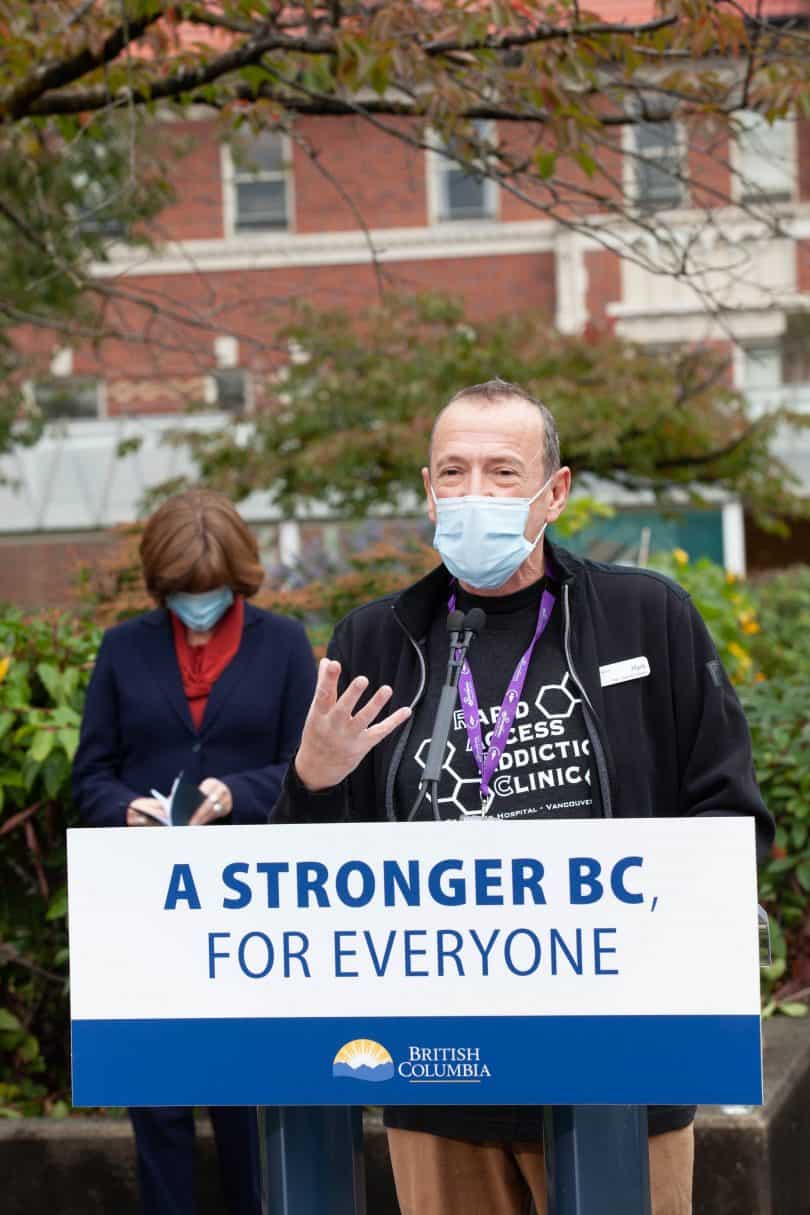This profile of Mark Haggerty is Part 5 in a 5-part series on this innovative clinic and a group of its staff members.
In 1993, Mark Haggerty was 27 years old and earning his living in Vancouver selling cars, which was no surprise to those who knew him as cars had been a passion since childhood.
At the time, Mark drank and was a recreational drug user—but he felt in control of his life.
A diagnosis of HIV, related to his drug use, changed all that.
“Today, I manage my HIV with one pill a day,” says Mark. “I can expect to live a long life. But in 1993, I was told my life expectancy was going to be short. HIV was a death sentence. I was young. It was devastating. As a result, the addictions I already had intensified. Mostly because I didn’t care anymore. The way I saw it, I was going to die anyway.”
In 1996, new medications changed everything. The new drug cocktail that changed the worldwide HIV landscape and gave hope to millions was developed in Vancouver, at the BC Centre for Excellence in HIV/AIDS at St. Paul’s under the leadership of Dr. Julio Montaner, who was also Mark’s doctor at the time.
Mark remembers this time clearly. For him, these new medications were a new lease on life.
“But after three years of alcohol and cocaine abuse,” says Mark, “my addiction had taken over my life and I realized I couldn’t stop.”
Things start to change… one shift at a time
For the next few years, Mark struggled to stay on his HIV treatment regimen but his addiction made it difficult—and dangerous. The new ARVs (antiretroviral drugs) needed to be taken consistently, without interruption. Otherwise, the body could develop a resistance to them. Routinely missing appointments and forgetting to take his pills, Mark was constantly at risk of this happening.
“Julio’s a star now,” says Mark, in appreciation of Dr. Montaner and the global impact his work has had, “but to me, Julio was my doctor, and I remember him explaining to me that I only had so many chances with these new ARVs, that if I didn’t take them as prescribed, they might not work.”
A turning point in Mark’s life came at the turn of the millennium when he was introduced to Positive Living BC, a group that helps people living with HIV. Mark appreciated the support and the opportunity to talk to others who were going through similar experiences. He began to volunteer at the organization and did so for the next ten years.
“I had one afternoon shift a week, helping out with reception,” says Mark, “and even though I was still in my addiction, I never missed that shift. It became a lifeline. It helped me be a part of something. It gave me my self-esteem back.”
In 2011, Positive Living BC began a peer navigator program. Peer navigators are people who have personal experience with an issue which provides them with unique insights they can use to help others dealing with similar challenges. Mark applied for one of the part-time, paid positions—and got it.
That job changed Mark’s life. It would also lead him, a few years later, to his role as a peer navigator at the Rapid Access Addiction Clinic at St. Paul’s (RAAC).
The importance of shared experience
In December, 2016, Mark was hired as a peer navigator at the RAAC, where the team already knew him and knew he’d turned his life around (at this point, Mark had been abstinent two years).
Of people who come to the RAAC for help, Mark says when they learn he has been through what they are going through, he can feel their level of anxiety go down. He says his job is to assure them that recovery is possible. To share his own experience. To talk or just listen. And to be sure they know he has no agenda beyond being there for them as a resource. He says patience is key.
“Often the people I talk to are in withdrawal or they’re detoxing, they’re sick,” says Mark. “They’re not always in the mood to talk, and some will leave. But I know that a few days later they may think, ‘That guy was alright. I had a good talk with him. He gets what I’m dealing with. I’m going to go back and talk to him again.’ That’s a big thing when that happens, when someone comes back. And they do come back.”
Mark sees this coming and going, the starting but stopping, as part of the recovery process.
“Relapse can be and often is a part of recovery,” he says. “Seeds are being planted so something can grow.”
Ultimately, Mark believes in the positive force of shared experience. From his own struggles, he knows he has insights that others do not. He considers the opportunity given to him by the RAAC “a gift” that reminds him of how grateful he is to be given a chance to help.
“It’s so important just to be there with a person, “ he says, “just to sit with them. That’s because addiction isolates you. Addiction uses all of your own power to isolate you from everyone else. It’s a horrible, lonely disease. But at the same time, when you decide to stop, it’s a sad day. Because your addiction helped you cope for so long. It was the most important thing in your life. Not a lot of people understand this side of it—but someone who’s been there does.”
With much room (and need) to grow this vital and already impactful program, friends of St. Paul’s Foundation are encouraged to help by making a donation to support the work of the Rapid Access Addiction Clinic.
